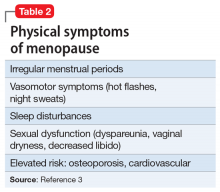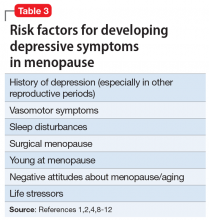Why menopause?
Menopause is a significant life event. The menopause transition begins around age 47 and lasts 4 to 7 years. By age 55, most women are postmenopausal. Symptoms of menopause are described in Table 2.3 Menopause is colloquially known as the “change of life”—not only because of the physical changes, but because of the meaning a woman may attribute to these changes. She may associate menopause with loss of femininity or attractiveness. Also, menopause may coincide with social and developmental changes, such as having an “empty nest”—her children having left home. How menopause is construed by a woman (and the culture/society in which she lives) impacts her experience of menopause.4Perimenopausal mood disorders
The SWAN Study (Study of Women’s Health Across the Nation) found that women’s risk of experiencing depressive symptoms was greater both during and after the menopause transition.5 A history of depression was the strongest predictor. Interestingly, the effect of menopausal status on the risk of depression was found to be independent of the woman’s personal history of depression, upsetting life events, vasomotor symptoms, and reproductive hormone changes. Two recent studies demonstrated that among women without a history of depression, depressive symptoms were more than twice as likely to emerge during the menopausal transition than premenopausally.6,7 Depression occurred in the context of the changing hormonal milieu. A recent meta-analysis8 found an inverse association between age at menopause and the risk of postmenopausal depression. Table 31,2,4,8-12 describes risk factors for developing depressive symptoms in menopause.
However, one should keep in mind that new-onset mania in menopause is rare and should trigger a medical work-up and a dementia evaluation.13 Table 414 provides recommendations for evaluation of women undergoing menopause.
Menopause and serious mental illnesses
A study of 91 perimenopausal and postmenopausal women (age 45 to 55) who were diagnosed with schizophrenia/schizoaffective disorder, bipolar disorder, or major depressive disorder (MDD) found that women with severe mental illness experienced significant vasomotor, physical, sexual, and psychosocial symptoms related to menopause.15 Furthermore, on 7 of 29 items on the Menopause Specific Quality of Life Scale, including hot flashes, women diagnosed with MDD reported problems significantly more often than women with other serious mental illnesses.15
Women with serious mental illness often have deficits in their knowledge about menopause.3 More than half of the 91 women in the study diagnosed with schizophrenia/schizoaffective disorder, bipolar disorder, or MDD felt more stressed related to menopause, and reported that menopause had a negative effect on their mental health.3 These women rated their top 5 symptoms potentially related to menopause as feeling depressed, anxious, or tired; lacking energy; and experiencing poor memory.3
Continued to: Role of estrogen on mood and psychosis




